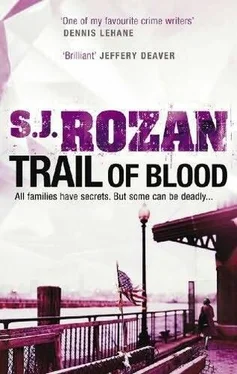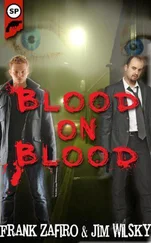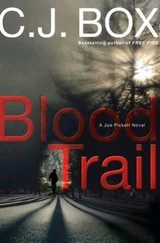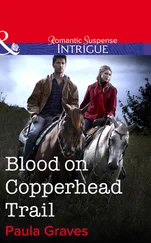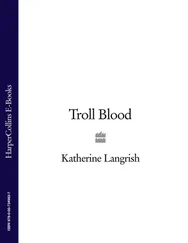S Rozan - Trail of Blood
Здесь есть возможность читать онлайн «S Rozan - Trail of Blood» весь текст электронной книги совершенно бесплатно (целиком полную версию без сокращений). В некоторых случаях можно слушать аудио, скачать через торрент в формате fb2 и присутствует краткое содержание. Жанр: Триллер, на английском языке. Описание произведения, (предисловие) а так же отзывы посетителей доступны на портале библиотеки ЛибКат.
- Название:Trail of Blood
- Автор:
- Жанр:
- Год:неизвестен
- ISBN:нет данных
- Рейтинг книги:5 / 5. Голосов: 1
-
Избранное:Добавить в избранное
- Отзывы:
-
Ваша оценка:
- 100
- 1
- 2
- 3
- 4
- 5
Trail of Blood: краткое содержание, описание и аннотация
Предлагаем к чтению аннотацию, описание, краткое содержание или предисловие (зависит от того, что написал сам автор книги «Trail of Blood»). Если вы не нашли необходимую информацию о книге — напишите в комментариях, мы постараемся отыскать её.
Trail of Blood — читать онлайн бесплатно полную книгу (весь текст) целиком
Ниже представлен текст книги, разбитый по страницам. Система сохранения места последней прочитанной страницы, позволяет с удобством читать онлайн бесплатно книгу «Trail of Blood», без необходимости каждый раз заново искать на чём Вы остановились. Поставьте закладку, и сможете в любой момент перейти на страницу, на которой закончили чтение.
Интервал:
Закладка:
“But I wasn’t up to the task. Under my inadequate command we stumbled into an ambush. Remembering a flooded marsh outside Shanghai where frogs were plentiful when I was a boy, I led the way. But Mao’s soldiers had reached the area before us, situating themselves on high ground. I might have seen evidence of their positions, had I known what to look for, but I didn’t. They pinned us down, and over three days they picked us off.
“At first we took aim, but shooting only drew their fire. So, in the steaming heat, soaked and starving, we waited to die. Crickets whirred and the wounded moaned. Otherwise all was still. Only when one of us, unable to bear it, tried to bolt, did we hear the whine of bullets. The wounded died and the dead began to rot. Crows circled and landed to feast. Mao’s troops amused themselves firing at the birds.
“Days and nights of this, until all around, floating in brown water, were the staring bodies of my friends. I thought, finally, I was the only man living. I decided to show myself and let the enemy end my miserable life.
“So I jumped up, arms wide, and shouted for the soldiers to shoot. There was no response. They were gone.
“I started to laugh. Unable to control myself, I collapsed in the mud. I’d have drowned there, laughing, if not for another soldier who’d seen my suicide attempt. He pulled me to drier ground, shouted and slapped me until the hysteria passed. As we struggled together from the swamp, we found one more man alive. Just one.
“Together we three resumed our stumble toward Shanghai. We stole clothing from the bodies of civilians-thousands to choose from, thousands!-so we could discard the tatters of our uniforms. We had rifles, but still we exhausted ourselves crossing fields and paddies to avoid the Red Army, which filled the roads. The details of that flight do not bear repeating. Until finally, four days later, we entered the city, to fight our way to the wharves.
“I couldn’t leave these men, do you understand that? They’d followed me into that swamp, and after what had happened, still they followed me out. But I knew I had passage on the Taipei Pearl, if I could reach the wharf. And they did not.”
He broke off, coughing. He gestured to a cup on his bedside table. Bill held it for him. When C. D. Zhang spoke again his voice was weaker, and I leaned to hear him.
“I was starving. I was beyond the end of my strength. That’s how I’ve explained my decision to myself, over the years. I was mad.
“Chen Kai-rong was responsible for my desperate situation. That was my logic. His escape was the reason my father and I had been forced to flee Shanghai and suffer the privations of war, while his family remained, comfortable in their villa, surrounded by their wealth. Of course that was absurd-if I’d looked I could have seen what the war had done to Shanghai. No one had comfort, no one had wealth. But I was mad.
“I led my companions to the Chen villa. We would steal what we could and barter what we stole to buy them passage on the ship. As we neared, my mind burned with the thought of the carpets, the paintings, the delicate porcelains. And one treasure more than all the others: the Shanghai Moon. I hadn’t seen it since I was a boy. Any of the hoard I imagined the Chen family to possess would have done to save my friends. But it was the Shanghai Moon that consumed me. Because it was not only a treasure of the Chen family but of the wife of Chen Kai-rong. He was responsible for my nightmare. As recompense for my suffering, I deserved the gem!
“By the time we reached the villa, I was aflame with fury and righteousness. We broke in easily-I knew the gates, the walls, their weaknesses, from days of childhood play. Screaming, waving our rifles, we forced everyone to the study. I must tell you, my resolve nearly broke when I saw my brother, thin and trembling. In my feverish visions of triumph and revenge, he had not appeared.
“But my companions were dismayed and panicked by the bare walls, the empty shelves. Where were the treasures? A smaller boy, a child I didn’t know, began to cry, and both Rosalie and my brother stepped forward to comfort and protect him. My brother, safeguarding a strange child! My duty to my friends became all I could see, all I lived for. I seized old Chen Da, Kai-rong’s father. Something must remain, some hidden treasure-the Shanghai Moon must be in the villa, I was sure of it. I beat him, an old man; I beat him and he would tell me nothing.
“Then… I don’t know. I don’t know precisely what happened. I heard a shot, and when I turned to look, it was not one of my men but the old houseboy-I remembered him, always slipping sweets to the children-and he aimed a rifle at me! I fired first. And my shot struck Rosalie.
“When Rosalie fell, the fog of madness cleared instantly. What had I done? Both children reached for her, wailing. I called out, ordered my companions to leave with me. As they had for weeks, they obeyed. The old houseboy chased after us. One of my friends stopped him with one shot.”
C. D. Zhang’s labored breathing and his pallor made me think he wouldn’t go on, but after a few moments he turned his gaze to me. “We took nothing with us. Do you understand? Nothing. If Rosalie wore the Shanghai Moon, my companion didn’t find it.”
It took me time to regain my voice. The Shanghai Moon seemed almost beside the point. Still, I asked, “How do you know? What’s to say he didn’t keep it from you?”
“Because he died! They died, both of them, fighting to force their way onto a ship on which they could not buy passage! The Shanghai Moon would have saved them. But they-we-didn’t have it.
“So I and my father sailed for Taipei, and my fellows died. We came to America, and I started a new life. But there’s no putting the past behind you, no matter what you’re told. The sight of my companions’ hands reaching out to me from the gangway has haunted me always. And another sight, so similar: those two young boys, reaching for Rosalie.”
Another cough; then, with clearly slipping strength, he resumed. “Twenty years later, when I received that letter from Shanghai, I felt I’d been given a new chance. I could help my brother and my cousin, I could save them, and we could be a family. But of course that hasn’t happened. It would have been much more than I deserved. My brother especially has always felt a discomfort in my presence. He’s a sweet-natured man and regrets this sentiment he doesn’t understand. As though his unease were the result of some flaw in himself.”
C. D. Zhang’s eyes slowly closed. “I didn’t take their money,” he murmured. “I’d taken far too much from them already.”
39
Bill and I had left the hospital and were back in Chinatown, but even these familiar streets didn’t give me any sense of being on solid ground.
“You think it’s true?” I asked. “What he said?”
“Could you tell a story like that if it weren’t true?”
“He killed Rosalie? But…”
“But you like him.”
“And he was family!”
“Families are complicated things.” He lit a cigarette and didn’t look at me.
I trudged on glumly. I didn’t like this new knowledge; it was weighty and disheartening and didn’t seem to offer any compensation, like for example help in figuring out where the million dollars was. Or the Shanghai Moon.
“We have a plan?” Bill asked.
“Are you kidding?” I turned down Mulberry for no good reason. At Bayard we stopped for a funeral to go by. In my mood, I wasn’t surprised; I might have conjured it. Red and yellow flowers frothed on the grille of the hearse, surrounding a photo of the deceased. A youngish man; I could see his wife and children in the next car, stunned and still. I wondered who was at home preparing the funeral meal, and whether it would be as chaotic as Joel’s shiva.
Читать дальшеИнтервал:
Закладка:
Похожие книги на «Trail of Blood»
Представляем Вашему вниманию похожие книги на «Trail of Blood» списком для выбора. Мы отобрали схожую по названию и смыслу литературу в надежде предоставить читателям больше вариантов отыскать новые, интересные, ещё непрочитанные произведения.
Обсуждение, отзывы о книге «Trail of Blood» и просто собственные мнения читателей. Оставьте ваши комментарии, напишите, что Вы думаете о произведении, его смысле или главных героях. Укажите что конкретно понравилось, а что нет, и почему Вы так считаете.
